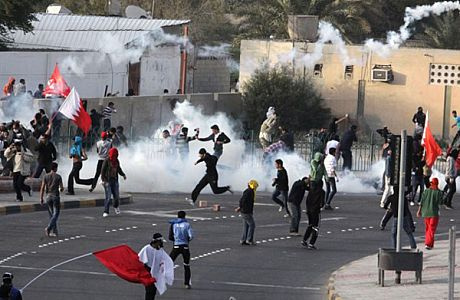Who Pursues Violence in Bahrain?

Last Tuesday, October 30th, Bahrain's Interior Minister declared in a statement that in order to safeguard the country's security, any demonstration and protest would be banned from that day on. This is while this tiny Persian Gulf island has been the scene of widespread popular protests since two years ago. The majority of these protests have been peaceful, and the people and opposition of Bahrain have demanded legitimate civil rights, including democratic changes, freedom of political prisoners, ban on torture, and freedom of expression.
The government of Bahrain used a few minor incidents, during which two policemen were injured and later lost their lives, as an excuse to surround Al-Aker Village, located south of Manama, for 10 days and searched each house and interrogated every individual of this village in order to arrest the person which was said to have thrown a Molotov cocktail at the police car. Exaggerating small incidents and mistakes committed by Bahraini youths has become an excuse for the government to deprive the people of their legal rights and the legitimate lever to peaceful demonstrations of several hundred thousands of Bahrainis.
Since mid-last year, the al-Khalifa regime, under pressure from the international community and human rights organizations, had officially permitted the legal opposition of this country to hold protests each week. The slogans and demands of the people, which are guided by the leaders of the opposition including Ayatollah Sheikh Isa Qassim and the Al-Wefaq political group, are enjoying vast support from independent human rights institutions, according to recognized international norms. During the past six months, the opposition has proved that it has the ability to bring 300,000 people to the streets through official invitations and that it enjoys the support of the majority of Bahrainis, an issue which has angered the government, because the King of Bahrain had claimed in one of his speeches that his opponents were a small and disunited group. The King's illusion ignited the weekly demonstrations with several thousand participants which continued until the issuance of the recent statement by Bahrain's Interior Ministry.
The prudence and patience of the legal opposition of Bahrain, which has led to undeniable achievements, must be admired. At the same time, radical forces, who, with no road map and no vision and no understanding of the regional and international conditions of the small island of Bahrain, take advantage of the sentiments of the youth to radicalize the atmosphere of the protests, must be criticized. Once, during the 2011 protests, this radical movement prevented the achievement of understanding between the moderate opposition and the moderate layers within the al-Khalifa government, and gave excuses to Saudi Arabia to dispatch military forces to this island and occupy the country. Two years have passed since the beginning of the peaceful protests, and although the government has not given valuable concessions to the people, the moderate and legal opposition of Bahrain have, several times, disclosed and condemned the nature of the ruling system at the international level and imposed heavy commitments on al-Khalifa. The government of Bahrain cannot easily ignore the enforcement of commitments such as the report of the Independent Commission, led by Judge Bassiouni, and the report of the Human Rights Council. At the same time, the opposition has been able to maintain the strong and lively presence of the people in the streets. Due to the intelligent method used by the opposition, the government of Bahrain is not able to take radical violent measures and this limitation has helped more people to participate in the protests.
The recent decision made by the government of Bahrain in preventing the demonstrations has been faced with the protests of Western governments, the UN, human rights institutions, and Western media. Amnesty International and the UN Secretary-General believe that this decision will lead to more violence. Nevertheless, the reactions of the US and Britain, as the two major supporters of the government of Bahrain, are not sufficiently strong and serious to exert pressure on their friends in Manama. This issue was reflected in recent reports by the Independent and Washington Post from Bahrain.
In response to international pressures, the government of Bahrain has declared that the decision to ban the protests is temporary and if security is provided, the people would once again be given permission to protest. It is obvious that the government of Bahrain, in comparison with other players involved in this crisis, takes more advantage of the violence and deviation of the protests from their peacefulness in order to suppress them without international pressures.
The insistence of the people of Bahrain on their legitimate demands and the continuation of peaceful protests and imposition of heavier commitments on the government is the assured and guaranteed method for their victory and achievement of their rights. Although this method requires great patience, the political and international realities of Bahrain show that other options will not lead to better results.
Originally posted on Bahrain Observer on Monday November 5th, 2012

